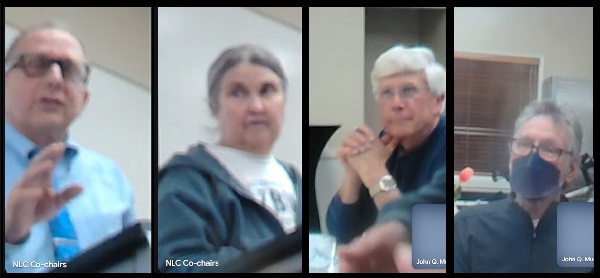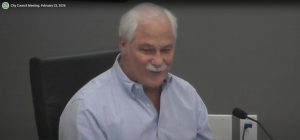Expecting deep cuts, neighborhoods weigh options
7 min read
Presenter: The proposed city budget will reduce the Office of Equity and Community Engagement by nearly half of its 5.85 FTEs (full-time equivalent employees).
According to an online document released April 25 titled ‘General Fund Budget Changes,’ this reduction will limit communication, outreach, and support for neighborhood associations; decrease capacity for equity and engagement consultation, training, and policy analysis; reduce but not eliminate support for hate crimes and discrimination victims, reporting, and human rights education; scale back support for the Human Rights Commission to maintain the minimum work required by city code; and eliminate HRC grants for community events.
Under the amended proposed budget, the office would retain 3 FTEs to support equity and engagement work.
Anticipating budget cuts, the Neighborhood Leaders Council met April 22. From Southeast Neighbors, Lucy Bambrey:
[00:01:00] Lucy Bambrey (Southeast Neighbors): We decided last meeting that as a group that we would have another committee to look at various scenarios that might happen, mainly the likely scenario that we may not have much funding or services after July 1.
[00:01:22] This is not an easy discussion. We’re not going to solve anything tonight and we recognize that and we don’t want to get down into the weeds too much, but we saw that there are two levels of concern.
[00:01:33] One is the individual neighborhood associations, you know, how any change is going to affect us as neighborhood associations.
[00:01:42] And then the second level is more overarching, is the Neighborhood Leaders Council, the NLC, you know: What are we going to do? How are we going to function? Do we have a mission?
[00:01:52] So we came up with maybe some suggested actions: each neighborhood association would probably need to assess and come up with a list about existing expenditures, the cost of the newsletters or mailings that you might do, meeting room fees, equipment rental, you know, all the things that it takes to continue with money to have these neighborhood organizations.
[00:02:22] How do we get out to our larger audience of our neighborhood if they can’t come in person? Meeting space fees, that’s a big one. Event equipment rental for picnics, for general meetings, you know, how much do you anticipate you’re going to spend for those types of expenditures?
[00:02:42] Presenter: She said neighborhoods may have to seek their own funding sources. Lucy Bambrey:
[00:02:47] Lucy Bambrey (Southeast Neighbors): So we talked about possible funding options: Obtain underwriting from community businesses or public interest groups: Do they want to help ‘sponsor’ a neighborhood organization? Incorporate advertising by businesses in neighborhood newsletters or events. There’s a possibility of seeking grants, to go through an organization like Eugene Neighbors Inc. (ENI) to do that, to help manage those grants.
[00:03:22] Or we can just go out and ask neighborhood residents to donate a certain amount, monthly, yearly, whatever. Do you want to donate to your neighborhood organization? You would get benefits by donating.
[00:03:38] Another one we talked about: Consolidating neighborhoods. You know what if we have joint meetings with adjoining neighborhoods or neighborhoods that have similar things in common. You know: similar problems, similar assets, similar types of joyful gatherings, whatever. Should we maybe consolidate and save costs that way?
[00:04:04] What role can a neighborhood, like the consortium, all of us play in successful continuation of supporting neighborhood associations? I mean, do we need to do something more than NLC where we get together once a month and we have representatives from most of the neighborhoods in the Eugene area?
[00:04:27] So there are so many different opinions in this room. And I think they need to be heard—this is my personal opinion—they need to be heard and listened to and find some common ground to stand on. That’s my personal opinion. That’s not from the committee, but that’s from me.
[00:04:45] And then how do we continue our relationship with the city? We had questions come up. For example, if funding and services are cut, how does that comply with the NORP? Is the city defaulting on their role in the whole NORP process? Do we need to be bound by the NORP anymore?
[00:05:07] And utilizing Eugene Neighbors Inc. to help manage grants or types of funding activities. And Randy (Prince) will talk about that.
[00:05:17] Presenter: From the Amazon Neighborhood Association, Randy Prince:
[00:05:21] Randy Prince (Amazon Neighborhood Association): Just one other detail when you ask neighbors for donations, that includes your online methods, your Patreon, GoFundMe, that type of a subscription thing. And there’s this, but there’s also that these days as a way to sustain with direct public donations.
[00:05:43] But yes, I want to describe ENI, which was actually created for just this scenario, 20-some years ago, 25 years ago, and odds are, we may need to really pitch in a lot.
[00:05:58] The services that we offer: They’re mostly in the financial area to provide a way for people and grant givers to donate that require a 501(c)(3). Individuals that want to make a donation, they want to get that tax deduction, we take the money, we’re certified, we make sure they get the letter so they can get it, sometimes the associations help generate the letters and so on, but we supervise it and that makes things go.
[00:06:29] It’s an all-volunteer group. And we supervise several projects at once, that are sponsored by neighborhood associations or expenditures that are the neighborhoods’ themselves, don’t maybe have a checking account, don’t have some continuity there. We helped out a few neighborhoods there.
[00:06:51] Some of the projects that we are responsible for the funding are sort of external, but sponsored by neighborhoods. They’re endorsed officially. And some are of the neighborhoods themselves.
[00:07:04] It’s also in our bylaws since we were formed to provide educational services. Now we do that in a minimal way by having one meeting a year. We buy pizza for everybody or you know, free food, and that’s our general fund expenditure. And we try to educate people or have something that will help the neighborhoods.
[00:07:26] But it’s also been in our purview that we could (and I think we may have in the past) had the kind of neighborhood services OECE has done in the past, like capacity building. How do you do fundraising? How do you keep this together and so on—the skills of operating a neighborhood association. So that was part of the vision of ENI.
[00:07:51] We were founded for this purpose. We have it in our mission. We’ve got all the structures.
[00:07:56] Presenter: From Friendly Area Neighbors, Tom Peck:
[00:07:58] Tom Peck (Friendly Neighbors): I think it’s important for the neighborhoods to know that you can use ENI for in-kind donation. So if a pizza parlor donates 100 pizzas and wants to write it off on their taxes, ENI will allow you to use their 501(c)(3) number, which is very nice.
[00:08:20] Randy Prince (Amazon Neighborhood Association): Yes, we have discussed that, the in-kind donation. We wrestled with some of these issues. I do want to point out though one other thing, that idea of ‘pass-through.’ If your neighborhood is large enough that you’re doing a lot of work and everything, we really can’t serve as a permanent umbrella over you. The IRS does not really approve that.
[00:08:41] But for small neighborhood associations when you’ve got a project and so on, that’s just lasting a year or something, it’s appropriate that we have the 501(c)(3).
[00:08:51] Presenter: Jon Belcher, from the River Road Community Organization.
[00:08:55] Jon Belcher (River Road Community Organization): It’s awfully hard to take money from kittens and battered women, but if we want to make an argument, we should be prepared to do that.
[00:09:04] There may become a point where we have to decide whether we want to argue for funding or not. And if that’s the case, that’s an if, it would be useful to have information about what the neighborhoods organizations have done over the past year similar to the report that we have done for Cindy and I suspect we could get past reports from you Cindy [Koehler]. Is that possible?
[00:09:33] So that would give us a body to argue before the council for more funding if and when that becomes necessary.
[00:09:41] Presenter: Budget Committee Chair Tai Pruce-Zimmerman, from Active Bethel Community:
[00:09:46] Tai Pruce-Zimmerman (Active Bethel Community, Budget Committee): Short-term advocacy through the Budget Committee is an option. Also, advocacy for the fire fee, if it does end up on the ballot, would be a step NLC could take that might affect neighborhood funding.
[00:10:01] I’ll say that ABC, as a neighborhood association, has passed the motion supporting the fire fee, should it go to the ballot. And I know Friendly did something similar. And so that is an option.
[00:10:13] Presenter: From Laurel Hill Valley, Tom Bruno:
[00:10:16] Tom Bruno (Laurel Hill Valley): Our money that the different neighborhoods receive is about $120,000 a year. And just so that everybody kind of understands, our hours that we report is in excess of 100,000 hours. So when you really talk about it, you know, we’re really talking about a dollar an hour. And if we had to hire consultants, we’re giving the city a major cost of wages.
[00:10:52] I don’t know how to articulate it other than try to put some numbers in here. $120,000 is a lot of money, but when you look at a $11.5 million shortfall, and we’ve got at least 100,000 hours, and pay ourselves a dollar an hour for the consultants. I’m just throwing that out so people understand.
[00:11:19] Presenter: Cindy Koehler confirmed, neighborhood associations provide 100,000 volunteer hours a year.
[00:11:25] Cindy Koehler (City, OECE): We generally provide the neighborhood associations $120,000 in support for events and publications—pays for your events, for your insurance, for newsletters, for facility rentals.
[00:11:40] Presenter: As the city manager proposes cuts to the neighborhood program, neighborhoods consider their next steps. They can make a strong case for continued funding, with or without the fire fee, to the Budget Committee and City Council.
[00:11:54] Or they can go off on their own, with the help of a nonprofit set up 25 years ago for this very purpose.
[00:12:02] The Budget Committee will get its first look at all proposed budget cuts Wednesday at 5:30 p.m.
This story produced by John Q and sponsored by the Whole Community Time Bank, recording volunteer hours for neighborhoods and nonprofits, including KEPW 97.3, Eugene’s PeaceWorks community radio.




